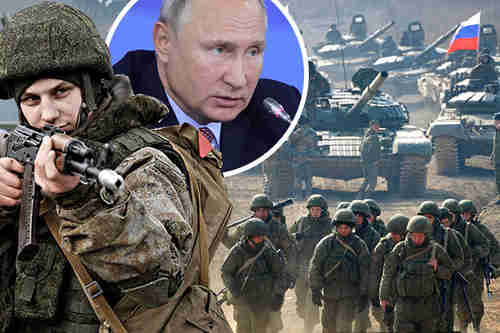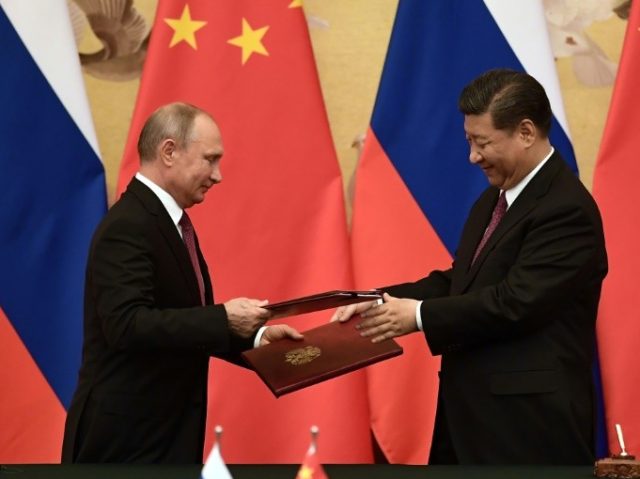This morning’s key headlines from GenerationalDynamics.com
- Russia, with China’s participation, launches biggest war games in decades
- Russia’s Vostok-2018 war games send a message to China
- Has Vladimir Putin forgotten the lessons of the Molotov-Ribbentrop Pact?
Russia, with China’s participation, launches biggest war games in decades

Putin and the Vostok-2018 war games
Russia on Tuesday launched Vostok-2018 (“East-2018”), its biggest military exercise in decades, involving 300,000 personnel, 36,000 armored vehicles, 1,000 aircraft, and 80 naval vessels from two Russian fleets. Three brigades of Russian paratroops will play a key role. The war games will last until September 17.
An important symbolic change this year is that 3,200 Chinese troops will participate alongside the Russian troops. Mongolia is also sending an undisclosed number of units.
One message being sent to the West is that Russia will be prepared to respond to U.S. military action in Asia if such ever occurs. A key aim of the exercise is to practice the rapid deployment of thousands of troops, as well as aircraft and vehicles, from western Russia to eastern regions, across thousands of miles, including in-flight refueling of fighter jets.
A second message being sent to the West is that Russia and China are “forming deep bonds,” to counter America’s international influence. Jamestown and Tass and Reuters and South China Morning Post
Russia’s Vostok-2018 war games send a message to China
The massive Vostok-2018 war games, the largest since the collapse of the Soviet Empire, are also sending a message to China that Russia is prepared to defend its Far East region from a Chinese military incursion. This, in fact, was the original purpose of the Vostok war games during the days of the Soviet Union.
This is the first time that any nation outside of the former Soviet Union has been included in the Vostok exercises. Many analysts believe that Russia decided that including a small number of Chinese and Mongolian troops in the war games is the best way to send the message that Russia is STILL prepared to defend the Far East, as well as to reassure both countries that the war games are not the precursor to an imminent invasion of either county.
Russia has been openly concerned about China at least since 2012, when Russia’s prime minister Dmitry Medvedev warned that a huge influx of immigrants from China threatened Russia’s control of Siberia and the Far East. ( “31-Mar-18 World View — Russia’s Far East, Siberia and Vladivostok under threat from China”)
In particular, Russia’s Lake Baikal in Siberia, the deepest lake in the world, is being buried in huge mountains of garbage from Chinese tourists. Chinese guides tell Chinese tourists that Baikal is China’s northern sea, that their ancestors used to live there, and that the territory only belongs to Russia for the time being. These guides also reportedly encourage Chinese visitors to buy property and businesses in order to make money over the next decade. Many are doing so.
Also, many Chinese on social media are suggesting that China should reclaim Vladivostok, the home of Russia’s Pacific Fleet, from Russia, just as China reclaimed Hong Kong from Britain. That is not going to happen without a war, and that is why Russia is sending China a message.
When Russia holds war games in the west, they are obviously aimed at NATO. But the Vostok games are held in the east, and there is no clear enemy in sight, so naturally the media assume that they are aimed at the United States. But, in fact, Russia has a far more immediate enemy in the region, and that is China. So even though China is participating in the war games, it is most likely that the war games are aimed at China. Moscow Times and Asia Times
Has Vladimir Putin forgotten the lessons of the Molotov-Ribbentrop Pact?
Much of what President Trump does is extremely perplexing because of his stated intention to not reveal what he plans to do. So many questions are left unanswered.
Why does Trump keep complimenting Kim Jong-un, when he must know that North Korea will never denuclearize? Does Trump really want to fire Jeff Sessions, or does he keep threatening to fire Sessions to protect Sessions, and allow him to implement Trump’s programs without criticism from the Left? When Trump met with Putin privately in July, did they discuss China’s plans for war with both of them?
The reality of today’s international politics is that a lot of people are playing “The Art of the Deal,” and one cannot be sure that anyone says what he means.
The Russians have hated the Chinese ever since the Mongols defeated the Chinese in 1206, and then went on to attack and conquer almost all the Russian principalities, and made them bitter vassals of the Mongol Empire, in a relationship called the “Mongol Yoke.” This hated period, two centuries long, has defined the relationship between the Russian and Chinese people forever. There is no possibility that China and Russia will remain “strategic partners” for long. In fact, Soviet Russia and China almost went to full-scale war as recently as the 1960s.
If Trump and Putin really did discuss plans for mutual defense after China’s military attack, then Putin must also be aware that China is planning war with Russia, and so this mutual “strategic alliance” between Russia and China is all a charade.
Probably the biggest diplomatic blunder in Russia’s history was Josef Stalin believing that Adolf Hitler would honor the Molotov-Ribbentrop Pact, which the two had signed on August 23, 1939.
That pact was a mutual non-aggression treaty that obligated the two countries “to desist from any act of violence, any aggressive action, and any attack on each other, either individually or jointly with other Powers.” Stalin was completely shocked and totally unprepared when Hitler violated the pact and invaded Russia to get some Lebensraum (“living space”).
We know that China has also been pursuing the same Lebensraum objective, at least since the time of Chiang Ki-shek after World War II. The Chinese Communist Party view of Han Racial Superiority is no different than the Nazi view of the Aryan Master Race. So it is absolutely certain that Xi Jinping will double-cross Vladimir Putin, just as Adolf Hitler double-crossed Josef Stalin.
So has Putin learned the lessons of the Molotov-Ribbentrop Pact? If so, then Putin and Trump certainly did discuss China’s plans for war in their private meeting, and Vostok-2018 is much less a message to the U.S. than it is a message to China that Putin won’t be a sucker like Stalin was. Jewish Virtual Library and Breitbart National Security
Related Articles
- Russia’s Far East, Siberia and Vladivostok under threat from China (31-Mar-2018)
- The Trump-Putin private meeting was almost certainly about China (21-Jul-2018)
- Poland welcomes biggest deployment of American tanks and troops in decades (15-Jan-2017)
- Russia’s concerns about China’s ‘invasion’ of the Far East continue (21-Jun-2015)
- Russia holds massive Vostok 2014 military exercises amid anti-US hysteria (26-Sep-2014)
KEYS: Generational Dynamics, Russia, Vostok 2018, China, mongolia, Dmitry Medvedev, Siberia, Far East, Lake Baikal, Vladivostok, Kim Jong-un, Vladimir Putin, Jeff Sessions, Mongol Yoke, Molotov-Ribbentrop Pact, Josef Stalin, Adolf Hitler, Xi Jinping, Lebensraum, Han Racial Superiority, Aryan Master Race
Permanent web link to this article
Receive daily World View columns by e-mail

COMMENTS
Please let us know if you're having issues with commenting.